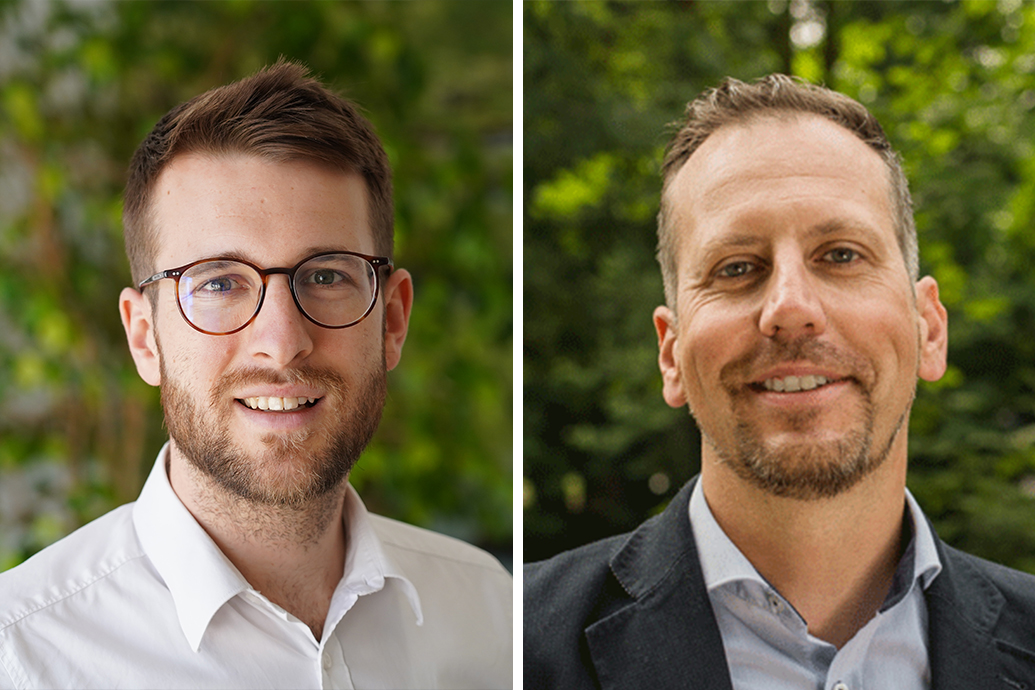Erik Mundinger and Markus Schmidt
Erik Mundinger, Sustainability Officer of UmweltBank AG
Markus Schmidt, Head of Treasury & Sustainability
What does Sustainable Finance mean to you?
Erik Mundinger: For me, Sustainable Finance is an essential part of the movement that wants to overcome one of the biggest challenges of the coming years: namely, to stop climate change. As part of this orientation, I have the opportunity to initiate and accompany change processes.
Markus Schmidt: If I look at Sustainable Finance from a meta perspective, a small plant has grown steadily here over the years. A few years ago, sustainability was still a marginal phenomenon in the financial sector, but now it is becoming a basic requirement. I am very pleased that sustainable finance has developed a significant relevance both socially and from a regulatory perspective. Because for me personally, sustainability has always been a matter of course over the last twenty years – underlying every financial activity.

What is the key to successfully developing the Sustainable Finance movement?
Mundinger: A key driver for further development and successful implementation is comparability. By this I mean uniform reporting standards and KPIs or key indicators, but also uniform commitments. Only if we speak the same language and mean the same thing when we talk about “sustainability” will we be able to implement the voluntary commitment of the German banks to achieve the climate goals. Of course, this also leads to the second driver: we have to work together on this across the banks and not turn it into an isolated challenge that each financial institution deals with on its own.
Schmidt: : I’ll pick up directly where Erik left off: We need a broad impact on all stakeholders, but especially on the clients and advisors in the banks. Every stakeholder will almost inevitably come into contact with ESG issues in the next few years – be it through internal requirements, regulation, the expectations of owners or employees. In this respect, I think it is desirable that we talk openly about further development and bring everyone on board. I think this is also where the Net Zero Banking Alliance Germany (NZBAG) comes in as a transformation hub for German banks. The key is therefore that we create broad acceptance and at least a basic understanding within society. Sustainable Finance is an issue for society as a whole.

“For me, Sustainable Finance is an essential part of the movement that wants to overcome one of the biggest challenges of the coming years: namely, to stop climate change.”
What role does UmweltBank play in this?
Mundinger: Of course, UmweltBank has a head start because we have been implementing and realising sustainability for decades. We would like to be a role model here and let other banks benefit from our experience.
Schmidt: If I may come back to my little plant: Together with some other pioneers, we are the “gardeners” who have nurtured and nourished Sustainable Finance over the years. Of course we want to be successful as a company, but we stand for the global goal of creating a world worth living in for future generations. Therefore, we see ourselves as an impulse generator, pioneer and proof that economy and ecology are also compatible in the longer term. After all, UmweltBank has been profitable for twenty years.
How do you assess the contribution of the Net Zero Banking Alliance Germany?
Mundinger: The NCBAG has developed into a central go-to place where the expertise and experience of German banks on sustainable finance come together. UmweltBank therefore appreciates the Alliance as an important body that provides good support in the implementation of the German banks’ climate commitment. In the joint workshops, we meet qualified sparring partners from across the banks. I am sure that the good contacts among each other will last beyond the NCBAG.
Schmidt: For me, the Green and Sustainable Finance Cluster Germany is one of the leading organisations that triggers harmonisation, consensus and joint transformation processes in the German banking landscape. The close cooperation is good for our financial sector. The banks that are already a little further along can show others that sustainable finance can be implemented and how, and we ourselves gain an insight into where the hurdles of the traditional banks lie in the transformation. We have definitely found some troublemakers here who are working with us effectively and ambitiously on a sustainable financial world.
“Unser unternehmerisches Denken und Handeln wird von einem Werteverständnis getragen, welches auch heute schon viele Nachhaltigkeitsfacetten enthält. Dies möchte ich weiterentwickeln und dazu beitragen, dass die Helaba einfach eine gute Bank ist, die ihre Kunden nachhaltig voranbringt.”

What is your personal goal?
Mundinger: I am determined to continue working on the change process towards sustainable finance. Because banks can steer financial flows and thus move much more in the world than you think. Being part of that makes me feel good.
Schmidt: At the micro level, I would like to make as much of an impact as possible in my direct job environment as far as the penetration of ESG aspects in financial areas is concerned. At the macro level, it is important to me to make my contribution to ensuring that ESG remains consensual and efficient, but also manageable. My goal will be achieved when ESG standards are fully integrated in all financial issues and are no longer seen as a speciality.


